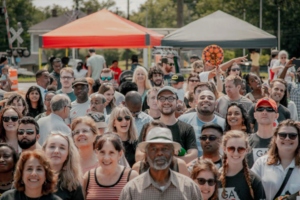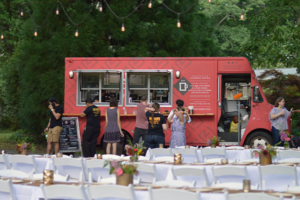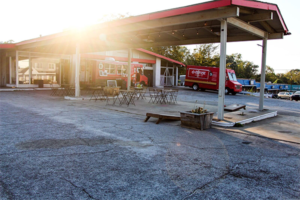
Like many refugees, Ali Mohammed has never known a life without war. His homeland, Sudan, was at war when he was born and is at war still. If you’ve met Ali here at Refuge, you know he has an easy smile, that he speaks softly and articulately, and that he makes a mean latte.
We asked Ali if we could tell some of his story to you. This is our constant dilemma: How do we hold sacred space for our trainees’ stories of trauma and yet tell you the biggest, deepest why of Refuge Coffee? The men and women who join us for one year are delightful, and we want you to know them, but we are careful to tell you only what they’re comfortable with. That means these “public” stories are never as complete, as paradoxically joyful and sorrowful as they are in real life. But you probably guessed that.
Ali isn’t sure exactly how old he is.
He says the teachers in the Ethiopian refugee camp where he spent most of his childhood just looked him over and guessed. So we’re going with his best guess: 22. He doesn’t really remember Sudan. His family fled to Ethiopia when he was small as the war ebbed and flowed—mostly flowed. When a peace agreement was reached in 2011, he remembers that most of the camp cleared out. Then the crowds returned. In eighth grade, he passed an exam that allowed him to travel to another city for high school where he lived alone for three years. “We suffered a lot, a lot, a lot,” Ali says.
Then Ali, his mom, sister, and two brothers jumped at the once-in-a-lifetime chance to come to the U.S. as refugees. His mother, who had suffered from a lung disease for 12 years, spent her first weeks in a hospital where she was diagnosed correctly and given proper care. Although she is now healthy enough to work a couple of days a week, Ali is the sole provider for his family. His first job was on a packing line at a factory almost two hours from Clarkston. Most days, he left home in the dark and returned in the dark. He’d yet to really see or experience his new home. He’d yet to learn the language, because his job wasn’t conducive to conversation. After four months, he took an exam, scored 100%, and got a promotion and a slightly better schedule.
One day, Ali stopped by Refuge for coffee with his work carpool.
Then he came on his day off. And then again. He found people who spoke his language here and people who would stop to listen to him practice his English. He says he “was praying all the day” when Ahmad mentioned that we were hiring.
Today, Ali’s command of the English language is remarkable after just four months. He absorbs our job training curriculum like a sponge and takes his lessons home to teach the rest of his family. He says he loves the way he learns here, where no one “teaches by force.” He dreams of getting his GED, of citizenship, and of a pursuing a career in civil service here so he can “serve the country that helped us a lot.”
To be honest, we weren’t surprised by this dream.
We don’t know where it will take him one day, but even in a country impacted deeply by war, Ali was a young man with a young man’s widening capacity to learn and dream. And we take satisfaction in knowing we have contributed to Ali’s deepening ability to execute a big dream of service to others. We do know Ali’s dreams inspire us to dream bigger.
We hope you feel that satisfaction, too. YOU help dreamers like Ali feel safe enough to take the next steps in those dreams. YOU help us tell these stories.




